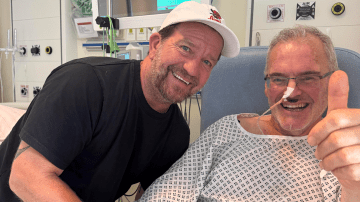Last week during International Leadership Week we saw many takes on leadership; what makes a good leader; how to be the best leader; what are the traits of a good leader.
In today’s Wellbeing Wednesday feature, Sue Pallot, Founder of The Coaching Agency and the Jersey Association of Coach Practitioners, explores the importance of self-care, emotional intelligence, and continual growth for effective leadership.
Being a leader is a tough job – who wants to be a leader? If you are a leader, how do you look after yourself? And if you become a leader, how do you know how to look after yourself?
We are familiar with sayings like, ‘you can’t pour from an empty cup’ and ‘put your own life jacket on first’, but how do we accomplish this as leaders?
I am the Chair of the Professional Development Committee at the Institute of Directors in Jersey and with my finance professional hat on, I advocate and hugely agree with gaining a qualification in Directorship. As part of the qualification there is a focus on leadership and the skills needed to be a leader. These skills are different to be a manager, but as a leader you already know this, right?
Upskilling in your profession is paramount to your success as a leader
Increasing your technical knowledge and being abreast of economic trends and developments in your sector will give you the confidence to make more informed and strategic decisions. Maintaining your CPD, helps to ensure your technical expertise is up to date, which helps you to navigate through your industry.
Surrounding yourself with good quality people
A good leader is not afraid of hiring someone better than them. They see merit from having someone with more experience working alongside them, whether it be technical or experience based, leaders seek opportunity to learn at every turn.
Delegation is a true skill
When mastered well, a leader can see their team thrive which in itself is rewarding – your job role as a leader should naturally evolve and change and you should be willing and able to change and adapt to the moving landscape.
Investment in you
We spend thousands of pounds on gym memberships and hobbies like cycling, running, sailing, to name but a few, which is fantastic for your body and soul, but what do you do for your mentality?
Seek feedback
This helps us grow, learn and to be a better leader. Ask for feedback from your peers, your colleagues, your team. Allow open honest trust led conversations. Be open to the feedback and be willing to use it to grow.
Reflection
Give yourself time to assess a situation, a project an incident. Ask yourself, what could I have done better; what could I have done different. What were the lessons learned and share those lessons with others so that they can benefit.
Be human
Show your vulnerabilities. People will see that you are not untouchable and will be more themselves around you which will bring out the best in them and you!
Do what you say you will do… simple!
“Be the change you want to see in the world.”
Mahatma Gandhi
These all seem like practical tools to help you as a leader, but the real work begins when you address your emotional intelligence as a leader.
As a qualified accredited coach practitioner, I work with lots of different people and my work with the senior and executive leadership teams, gives me great joy and insights into the challenges that leaders face today. Through the art of coaching, a person is given a safe space to explore their potential, to allow themselves to take the time to answer the questions that they may never have had the time to ponder. With the help of a coach, you can unlock even greater potential that you have within to make you an even better leader, peer, and colleague.

As a coach, there are many tools that can be used in the coaching relationship. There are many modalities and as part of my practice I use the T.G.R.O.W model. This simple and effective, tested model is one that you can use in your personal and professional life. First introduced by Sir John Whitmore, in the 1980’s and uses the core principles in his world-renowned book, ‘Coaching for Performance’ which is now in its 25th edition and has been translated into 20 languages.
Of course, as a coach and a mentor, I have studied the works of many of the prime architects and pioneers of coaching and mentoring from Stephen Covey, Tim Gallway, Bob Proctor, and many others. I believe in this practice; I know its benefits and I know it works.
Many of our world leaders will say that they have had or have a coach and or a mentor which has contributed to their success. Having a soundboard, a confidant outside of your business interests, someone that you can go to, to bounce ideas off, someone who acts independently and has knowledge in the area of expertise that you lead in. A mentor can provide you with that guidance, a steer when sometimes your gut instinct needs some back up! In my mentoring role, leaders sometimes just need someone to say: “Yes, that seems reasonable approach” or “No, based on what you’re telling me, that maybe not be the best way.”
So, you have found a coach, a mentor, you’re training your brain with technical knowledge, you are surrounding yourself with clever, driven future leaders but what’s missing?
As a leader, the simplest effective approach is one that you are already have built in. Your coach will guide you to unlock this skill but there are simple questions that you can ask yourself in times of strife, when you feel that you need clarity.
The five “W’s” work well when you are at a crossroads … these are some open-ended questions:
- Who: Who am I trying to please?
- What: What (exactly) do I want to achieve?
- When: When does this task need to start/end?
- Where: Where are my skills needed at this present time that would be most effective?
- Why: Why am I doing this? Why is this important to me?
Never lose sight of ‘the Why’. This is intrinsically linked to your values and if you keep sight of your values and your ‘why’, then the answers will become clear.
The members of the Jersey Association of Coach Practitioners represent qualified, training, and aspiring coaches. Their mission is to bring together a wealth of coaching expertise, to support one another, to collaborate, promoting good quality coaches, bringing credibility to the coaching practice by encouraging qualification and accreditation, and to support and encourage continued professional development, whilst educating on the benefits of coaching.
Main picture: Sue Pallot
Click here to go to our Wellbeing section …
…
… and click here to subscribe to our daily newsletter – meaning you will never miss a thing.














